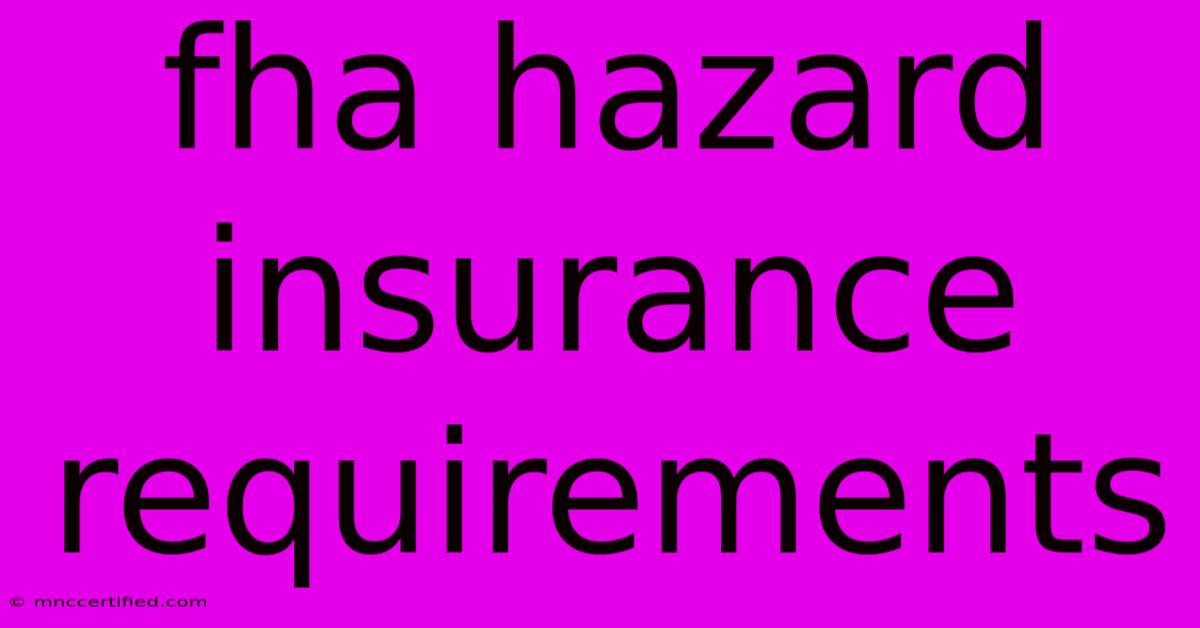Fha Hazard Insurance Requirements

Table of Contents
FHA Hazard Insurance Requirements: A Complete Guide for Homebuyers
Buying a home is a significant milestone, and understanding the insurance requirements is crucial, especially with an FHA loan. The Federal Housing Administration (FHA) sets specific guidelines to protect both the borrower and the lender. This guide will thoroughly cover FHA hazard insurance requirements, ensuring you're fully informed throughout the home buying process.
What is FHA Hazard Insurance?
FHA hazard insurance, often referred to as FHA insurance or mortgage insurance, is not the same as homeowner's insurance. Homeowner's insurance protects your property from damage (fire, theft, etc.), while FHA insurance protects the lender against financial loss if you default on your mortgage. However, you still need homeowner's insurance to get an FHA loan. This is a common point of confusion. Let's break it down:
- Homeowner's Insurance: Protects your personal property and the structure of your home against various risks. This is a requirement for obtaining an FHA loan.
- FHA Mortgage Insurance Premium (MIP): Protects the lender (the bank or mortgage company) against losses if you default on your FHA loan. This is upfront and annual.
FHA Hazard Insurance Requirements: The Essentials
To secure an FHA-insured mortgage, you must meet several key insurance requirements:
1. Homeowner's Insurance is Mandatory:
Before closing on your FHA loan, you must have a homeowner's insurance policy in place. This policy must meet the lender's minimum coverage requirements, typically covering the full replacement cost of your home and its contents. Failing to provide proof of homeowner's insurance will delay or prevent your loan closing.
2. Understanding the FHA MIP:
The FHA Mortgage Insurance Premium (MIP) is a crucial component of FHA loans. It's a form of insurance that protects the lender if you fail to repay your mortgage. MIP is usually paid in two ways:
- Upfront MIP: Paid at closing. This amount is typically 1.75% of the loan amount and can be financed into the loan.
- Annual MIP: Paid monthly as part of your mortgage payment. The amount varies depending on the loan term and type. For loans with a down payment of less than 10%, annual MIP is typically required for the life of the loan.
Note: The requirements for annual MIP have changed over time. It's crucial to consult with your lender for the most up-to-date information.
3. Meeting Lender Requirements:
Each lender may have its own specific requirements for homeowner's insurance, beyond the basic FHA guidelines. It’s important to carefully review your lender's requirements before securing your policy.
4. Flood Insurance (if applicable):
If your property is located in a high-risk flood zone, you'll need flood insurance in addition to your homeowner's insurance. This is a separate policy and is often required by both the FHA and your lender. Ignoring this requirement can result in significant financial penalties.
5. Maintaining Continuous Coverage:
Maintaining continuous homeowner's insurance coverage throughout the life of your loan is crucial. Laps in coverage can lead to penalties or even foreclosure. Make sure to pay your premiums on time and notify your lender of any changes to your policy.
Finding the Right Coverage: Tips for Homebuyers
Obtaining the necessary insurance for your FHA loan doesn't have to be complicated. Here are some helpful tips:
- Shop around: Compare quotes from multiple insurance providers to find the best rates and coverage options.
- Understand your policy: Read your homeowner's insurance policy carefully to understand what's covered and what's not.
- Communicate with your lender: Keep your lender informed of any changes to your insurance policy.
- Check your flood zone: Determine if your property is in a high-risk flood zone and obtain flood insurance if necessary.
By understanding and adhering to these FHA hazard insurance requirements, you can navigate the home-buying process with confidence and secure a successful FHA loan. Remember, proactive communication with your lender and insurance provider is key to a smooth and stress-free experience. Don't hesitate to ask questions – it's better to be informed than to face unforeseen complications later.

Thank you for visiting our website wich cover about Fha Hazard Insurance Requirements. We hope the information provided has been useful to you. Feel free to contact us if you have any questions or need further assistance. See you next time and dont miss to bookmark.
Featured Posts
-
Coleen Rooneys Marriage Net Worth Explored
Nov 18, 2024
-
Colts Vs Jets 2024 Live Stream Guide
Nov 18, 2024
-
Mc Ilroy Claims Sixth Race Title
Nov 18, 2024
-
American Insurance Albuquerque Nm
Nov 18, 2024
-
Storm Warning Heavy Rain And Wind
Nov 18, 2024